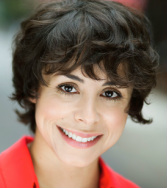
"Spirits of Another Sort Workshop Journal #1 - Origins."
To actually work towards a fully staged, professional production of one of Shakespeare’s most popular and beloved plays with an integrated cast of able-bodied (The Athenians), physically disabled (The Fairies) and intellectually disabled (The Rude Mechanicals) actors would certainly pose challenges, require flexibility and a new approach from everyone involved, but in my mind it was never outside the realm of possibility. My collaborators were fully on board, and yet, I was again confronted with several challenges; primarily, the perception that working with actors of various disabilities would be too difficult, pose too many problems and potentially be off-putting to a mainstream audience. I feel all of this is true to some extent and these perceptions are exactly why I feel that this workshop needs to happen.
Personally, I had never worked with the Intellectually Disabled before. My focus and experience is as a white, American male with Cerebral Palsy- a Physical Disability. The two are very different. Often, people don't make this distinction, much to my chagrin. If potential directors, producers or theatre professionals have anxiety about working with these populations I understand. I feel the exact same way.
For "Spirits of Another Sort" We needed to find a director who in a sense was fearless, and who would approach the work as any good director would, by telling the story of the play well and essentially.
We met with various directors, all very experienced and respected in their field. Many expressed concern about never having worked with the intellectually disabled before and approached the project with some trepidation. In addition, they astutely pointed out that the Rude Mechanicals were of a lower class economically then the rest of the characters in the play and worried about what the play might be saying through its choice to cast intellectually disabled actors in this light. In Act V Scene I, the play within the play, these characters are openly mocked by the Athenian audience. Would our casting decision make people uncomfortable in these moments? Most likely. This question of Class vs. Disability is the biggest uncertainty hanging over the project at the moment.
Disability by its very nature is anxiety inducing and can be alienating but I think this has to do more with a lack of visibility and exposure. I'm also interested in that tension between disabled actor and Audience and how it plays out meta-theatrically. Will the audience be able to laugh at a Snug with Down Syndrome? A Bottom with a Learning Disability? When Titania crosses the stage in a wheelchair what will it say?! Have we made the comedy off limits? Is the play now something else? Have we reappropiated Midsummer for our own personal agenda so much that it interferes with the comedy? It was a lot to think about. We could let these issues (ahem) cripple us or we could keep going as planned. Anne Bogart has said, "You cannot create results. You can only create conditions in which something might happen." We were all interested in what might happen.
Potential directors also raised the question of “Authenticity.” Able-bodied themselves, they were concerned that due to their lack of experience working with these various populations, that they wouldn’t represent these characters sincerely and accurately. Directors expressed concerns about being able to run the room by themselves and requested extra hands in addition to the two highly trained and experienced teaching artists and theatre professionals that would already be present in Sara Buffamanti and Becky Leifman.
These conversations were extremely valuable and taught us a great deal about how to approach the workshop. We are indebted to everyone we met with. They have in their own way, contributed greatly to the piece. Eventually, we unanimously agreed upon a director (who is able-bodied) with extensive experience working with actors with physical and intellectual disabilities who possesses a personal desire to bring more artists with disabilities visibility on stage. Perfect. This seemed like a match made in heaven...Who was it that said, "the course of true love never did run smooth...?"
A week before our first rehearsals, after holding auditions for the Rude Mechanicals in New York City and casting those roles, the director called me and regrettably had to back out due to another job. Well, sh*&*. I will never begrudge another person work. Particularly work that pays more than the paltry sum I can currently offer. This director was gracious enough to recommend someone they thought might be a good fit and our scramble to find a replacement began immediately.
Alice Reagan has now joined us as director. Alice is a graduate of Columbia University's MFA directing program and Assistant Professor of Professional Practice at Barnard College. While she herself has never worked with people with disabilities before, she has extensive credits and experience directing classics and new plays that experiment with form and content. We are very pleased that she was available and thrilled to have her.
I was unfortunately out of town for the audition process, but Sara, Becky and Stephen Bennet (Peter Quince) were present with the director. Sara (who will also be playing Hermia), will speak on how these auditions and the development of the curriculum for the Rude Mechanical rehearsals was developed and initiated.

This philosophy began with our auditions. A traditional "breakdown," was sent out to interested parties. Actors were asked to prepare: A piece of memorized text, a song, a dance and a joke to share with the room. The auditions were run with the spirit of ensemble driven, collaborative theater making. There was a collective warm-up consisting of exercises that addressed concentration, body awareness, release of tension, sound and movement and ensemble building. All of the actors stayed in the room for the entirety of the audition and their parents were invited not only to watch the auditions, but to participate in the exercises. For example, the songs prepared by the actors were sung campfire style- the auditors, auditioners, and parents all sitting in a circle and contributing a song. What became apparent about intellectual disability throughout the audition process is the vastness of the spectrum, particularly, when the actors were asked to speak their prepared texts. Each actor's particular disability affected the way in which they crafted and performed their piece. One actor came in off book with a piece from Amadeus after working with an acting coach. All of his choices were bold and committed, but bore a striking resemblance to Tom Hulce's performance in the film. Another actor with Downs Syndrome, performed Jaques, "Seven Ages of Man" speech from As You Like It, each word with a specific choice of dynamic suited to the image and several well practiced gestural and blocking choices. Other actors read their texts off of a cell phone or paper. Some needed prompting from one of our auditors. One actress played Act 2 Scene 1 of Midsummer; the scene between the First Fairy, Puck, Titania and Oberon all by herself, changing her voice to take on a new role. This excited me, because all of the actors auditioning were breaking traditional "rules," associated with professional acting and having a blast doing it. They were the Rude Mechanicals.
We are now in our third and final week of workshops with the actors who were cast in these roles. Like all actors, each of these individuals brings their own particular idiosyncrasies to the process. Some actors need to be encouraged to take risks and not worry about being right all the time, others on making eye contact with the person they are speaking to, some with issues of articulation and slowing down the text enough to be understood, others to retain work they have done on making the text personal while embracing the figurative language. Regardless, the actors have been 100% game to try any exercise or suggestion we have thrown at them. This has made for an immensely positive and exciting work environment. We have made an effort to eliminate speaking to the actors in a condescending or child-like tone. We have made an effort to not tolerate or allow behavior that a professional actor would never consider bringing into a room. Sometimes we are successful, sometimes allowances are made. Cell phones are a problem. Whenever "Access-a-Ride" decides to show up, rehearsal for that actor is over.
As we head towards the beginning of our official rehearsals, our primary concern is the learning and retention of lines, as well as the physical choices that the actors have discovered over the course of the workshops. We are currently exploring ways of helping the actors to manage their week off, giving micro assignments, and finding ways to hold them accountable to themselves and their ensemble. That being said, the actors are aware that this project is, for lack of better phrasing, "A big deal." After finding out that she was being paid for her work, one actress exclaimed, "This is my first job!"
-Sara Buffamanti
Gregg Mozgala, Artistic Director
 RSS Feed
RSS Feed